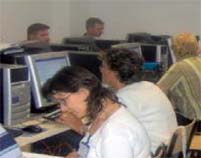Schools are Wired, Teachers Innovate: E-School Makes an Impact
Preparing Macedonian youth for employment through ICT-informed education programs and improving quality and relevance of instruction at the secondary level
February 2006

Teachers use an E-School Lab
Information Communication Technologies (ICT), if appropriately used, can bring about new and innovative teaching and learning practices among educators and students. dot-EDU’s E-School project in Macedonia is pioneering uses of ICT for improved teaching and learning--and is demonstrating quantifiable impact.
Through funding from the United States Agency for International Development’s (USAID), this dot-EDU initiative is being implemented by Education Development Center, Inc. (EDC) together with its partners World Links, NetAssessment, and the Academy for Educational Development (AED). E-School is deploying computers donated by the Government of the People's Republic of China, in cooperation with the Ministry of Education and Science (MoES) of the Republic of Macedonia. The goals of the E-School project are to install computers in every primary school and high school in Macedonia and to train teachers to use technology to support student-centered and
project-based pedagogy. E-School is advancing the Macedonia National Education Development Strategy to base “the educational process on the principles of interactive teaching, with a focus on creative learning, critical thinking, problem-solving and implementation of modern education technology.”
Every School with Computers and Network!
Two years into the project, E-School has installed 5,276 computers and every single primary (360) and secondary (100) school in Macedonia has a networked computer lab. Schools also have access to the Internet (see Mk.Connects project). E-School has trained 180 master secondary teachers and approximately 2,500 secondary teachers so far, and is currently preparing to train over 5,000 primary teachers and to install an additional 2,000 PCs in primary schools in the coming year.
The E-School secondary teacher professional development workshops held during the summer of 2005 used guidebooks developed by the E-school team entitled Teachers’ Guide for Innovative Use of ICTs which included three component goals and outcomes for teacher professional development: 1) project-based learning, 2) ICT integration into curriculum, and 3) community linkages. Workshop activities included:
- Blogs - Participants learned to build an understanding of the techniques and tools of web publishing/blogging; found individual purposes and uses for blogging; developed appropriate content for those purposes; practiced elements of project-based learning; identified and formulated problems, communicated, exchanged ideas, worked in teams, and evaluated each other; and included project-based learning techniques in units and lesson plans.
- Desktop Publishing – All participants learned desktop publishing skills (i.e., MS Publisher) and developed effective, creative communication skills for newsletter writing and layout. Participants learned additional elements of project-based learning such as creativity, leadership, and how desktop publishing and project-based learning techniques can be included into unit and lesson plans.
- Curriculum enrichment - All participants learned to develop unit plans and lesson plans incorporating ICT, problem-based learning pedagogy, and linkage to the community. Participants developed unit plans that consist of necessary lessons that integrate ICT, problem-based learning, and community linkage within existing curricula for the first semester of the 05-06 academic year. They also learned how to build on the skills learned in the previous web design session and created a website.
- Web publishing - All participants learned to become familiar with website terminology before being exposed to web-design; to upload documents and web-pages on a server; and to publish technology-integrated unit plans.
- Project Presentations – Teachers presented the projects that they implemented in the past school year.
Secondary Teachers Demonstrate Innovation!
More important than just offering workshops, the E-School team was particularly interested in making sure that the professional development activities for secondary teachers were indeed having an impact. In other words, were teachers applying what they learned during the workshops? E-School’s implementing partner, NetAssessment, charged with the Monitoring and Evaluation of the E-School program, undertook an impact evaluation in May 2005.
The E-School team was pleased to learn that the impact of the E-School teacher professional development workshops is significant-- 93% of targeted secondary teachers surveyed have implemented group-based learning or project-based units using innovative teaching practices. Moreover, the majority of the surveyed projects showed evidence of innovative learning methodology aimed at student-centered learning and signaled a divergence from the prevalent rote teaching and learning.

And last but not least, the quality of the projects analyzed in the assessment was impressive. In one example (illustrated in the figure above), a nutrition project developed by two teachers at the Orde Copela High School in Prilep, Macedonia, showed advanced levels of innovation, collaboration, and alternative teaching practices. The project offered compelling evidence of educators and students coming together on the basis of a common interest and in an environment where the students’ questions drove the nature and scope of the project activities. The project in fact reflects the thinking of its young authors who in turn, crafted a knowledge base that clearly exceeded the original goals of the curricular content.
What’s Next?
E-School’s partner, NetAssessment, has pulled together a compendium of all the innovative ICT-enhanced projects developed by the secondary teachers and will be available for review in the coming months. The E-School team is also busily preparing for the capacity building workshops that will target over 5,000 primary teachers. Stay tuned for more exciting news!
For more information, please contact:
- EDC Project Director, Sonia Arias, sarias@edc.org
- EDC Chief of Party, Zdenka Nikolovska, znikolovska@edc.org
- EDC Project Coordinator, Konjit Hailu, khailu@edc.org
